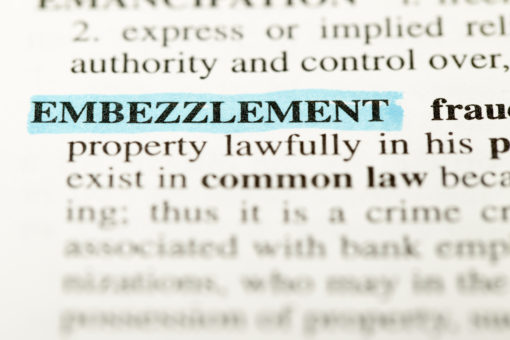Under U.S. federal law, embezzlement is a type of white-collar crime that involves the theft of money, valuables, or other items of value. Embezzlement differs differently from other theft offenses in that the legitimate owner of the stolen item voluntarily relinquishes custody of it. Federal crimes of embezzlement must also involve U.S. government assets or an equivalent federal interest.
Read on for more information. Contact Chambers Law Firm at 714-760-4088 if you are in need of a free legal consultation with an experienced federal defense attorney.
What does embezzlement mean under federal law?
In the historic case of Moore v. United States from 1895, the U.S. Supreme Court gave a broad definition of embezzlement. According to the Supreme Court’s definition, embezzlement happens when a person is given legal access to property by its legitimate owner. But afterwards, with the intention of robbing the legitimate owner, the person unlawfully gains possession of the concerned property.
Embezzlement and other theft crimes differ significantly from one another in this situation. In cases of embezzlement, the legitimate owner surrenders the item or gives permission for someone to take it. The person then forcibly denies the rightful owner use. The initial taking always takes place without the consent of the rightful owner in theft or larceny instances.
How does federal law address the theft of government property?
To establish the crime of embezzlement, the following legal components are typically needed. The prosecution must show that the perpetrator took possession of the property while working for the U.S. government, that the perpetrator fraudulently converted or appropriated the property for their own use, and the perpetrator intended to deny the rightful owner of use of the property. There is also a trust or fiduciary relationship between the perpetrator and the rightful property owner.
Because the culprit must have intended to deny the rightful owner of use, embezzlement falls under the category of crimes with specific intent. Embezzlement, however, does not need the culprit to aim to permanently deprive the lawful owner, unlike other stealing offenses. Therefore, it makes no difference if the offender later gives the stolen goods back to its rightful owner. The fact that the item has been restored does not justify theft.
How does federal law address embezzlement from organizations received government funds?
Similar to those outlined in the previous section, this offense requires the same legal criteria to be proven. However, there is a significant financial prerequisite before federal legislation can be applied. A theft of property from an entity that has recently received at least $10,000 in federal support is required for it to be considered a violation of this law. This particular type of embezzlement does not occur if such an entity did not obtain the necessary federal aid in the 365 days prior to the alleged misappropriation.
Federal law’s embezzlement penalty
A 10-year prison sentence and fines equal to the value of the stolen property are possible penalties for embezzlement. However, if the stolen property is less than $1,000 in value, the offender may only receive a one-year prison sentence.
If you are facing this or other federal charges, contact Chambers Law Firm at 714-760-4088 today for immediate legal assistance.





